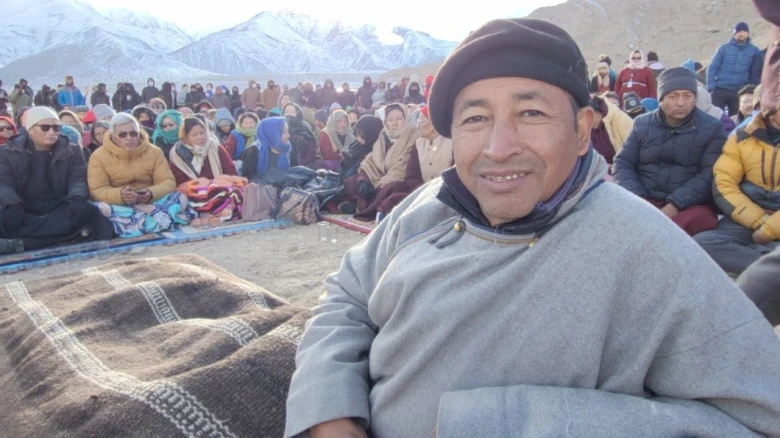Wangchuk, an engineer as well who is developing sustainable solutions at his Himalayan Institute of Alternative Ladakh, named his protest a "climate fast."
Digital Desk: Thousands of people in the far-flung Ladakh area have been staging protests in freezing temperatures for more than two weeks to demand constitutional provisions from the Indian government that will protect the delicate environment of their territory and grant them autonomy over issues about land and agriculture.
Situated amidst China, India, and Pakistan, Ladakh has experienced both environmental degradation and territorial conflicts. People's lives were changed by floods, landslides, and droughts brought about by changing weather patterns in the thinly populated settlements.
Sonam Wangchuk, a well-known climate activist, is participating in the Leh protests. Since the beginning of the protests on March 6, he has been fasting outside in the freezing cold, surviving solely on salt and water.
Wangchuk, an engineer as well who is developing sustainable solutions at his Himalayan Institute of Alternative Ladakh, named his protest a "climate fast."
"These glaciers and mountains will be destroyed if there is not a check on unbridled industrial development and military maneuvers" in the area, We're already facing climate disaster, Wangchuk told The Associated Press on Sunday.
Millions of people's access to water is at risk due to the thousands of glaciers that make Ladakh, a rocky area known as the "water towers of the world," melting at an alarming rate. The militarization of the region and the deadly military standoff between China and India since 2020 have made local pollution worse, which has made the melting worse.
Furthermore, he stated that Ladakh is in dire need of ecological preservation since the mountains are "part of the Greater Himalayas, intricately linked to over two billion people and multiple countries, so it's not just a local disaster in (the) making."
According to Wangchuk, the Ladakh nomads were also losing valuable pastureland to Chinese encroachment and massive Indian industrial projects. Shepherds in the area claim that the Chinese military has taken control of many pasturelands and is preventing them from letting their cattle graze.
Later this month, the shepherds and Wangchuk intend to march to the Chinese border to draw attention to what they claim are Beijing's territorial grab attempts in Ladakh.
After New Delhi withdrew the disputed region of its statehood and semi-autonomy in August 2019, Ladakh was divided from Indian-controlled Kashmir.
A crackdown on dissent of any kind and a plethora of new laws have mostly hushed restive Kashmir, but in Ladakh, demands for political rights have escalated with calls for statehood and the ability for local legislatures to enact legislation pertaining to land and agriculture.
Representatives from the area have met with powerful Indian Home Minister Amit Shah earlier this month, among other Indian authorities, on multiple occasions, but discussions haven't paid off.
“This government likes to call India the ‘Mother of Democracy’,” Wangchuk recently posted on X, formerly Twitter. “But if India denies democratic rights to people of Ladakh & continues to keep it under bureaucrats controlled from New Delhi then it could only be called a Stepmother of Democracy as far as Ladakh is concerned.”

Leave A Comment